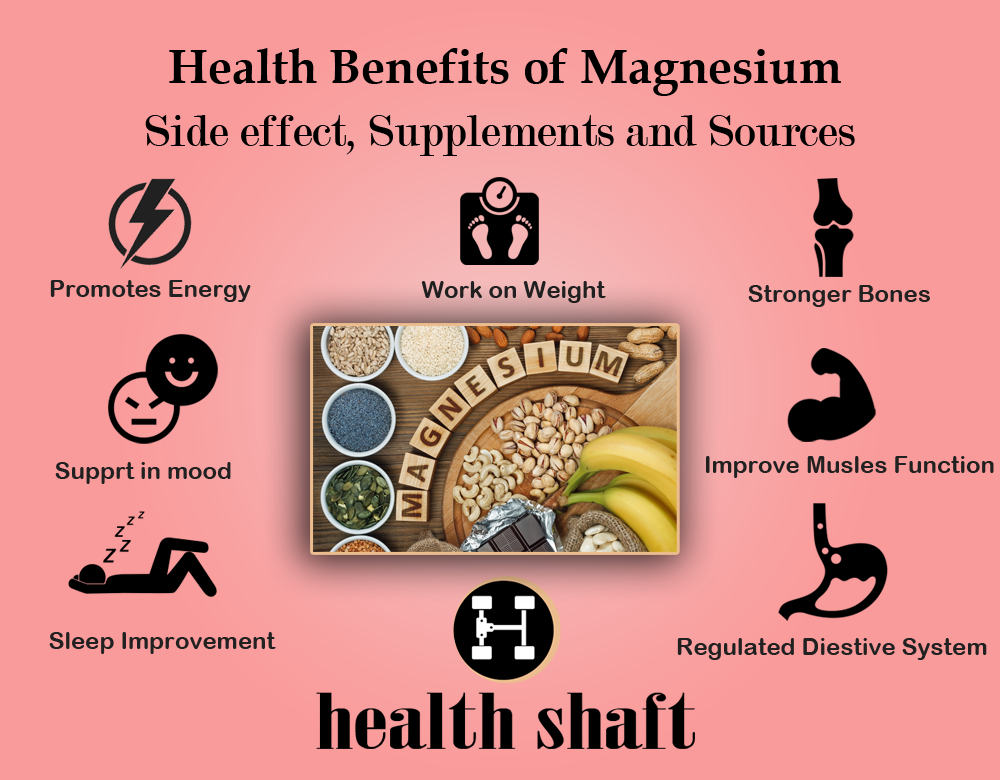Magnesium is an important mineral for normal bone formation in the body. When person feels constipation at that time magnesium is provide as a substitute.
Table of Contents
What Is Magnesium?
Magnesium is an electrolyte or nutrient, which give relaxation of muscles, keep heart to functioning well, and make our born strong.
Cell, Gland or other organ doing secretion process to release useful substance for that magnesium is very key mineral to running that process.
For the diabetic patients, Magnesium is very important to keep maintain action of Insulin which help where glucose will use for energy activity and storage for future need.
High-fiber foods are usually high in magnesium. Food sources of magnesium include legumes, whole grains, vegetables, broccoli, squash, and raw vegetables), seeds, and nuts (especially almonds).
Biggest source of magnesium is natural drinking water , but now a days people belive to drink soft water but they don’t know in purifying process many minerals are loses in that magnesium is also removed. So should drink hard water that rich in minerals.
Every where Magnesium is available on the earth like in humans, green plants , water at all natural sources
Magnesium is needed for more than 300 chemical reactions in the body as total 60% part of magnesium available in humans body born. Body muscle development and its function require Magnesium and it keep a healthy immune system and keep stable our.It helps to produce energy and protein.
There is ongoing research on the role of magnesium in preventing and controlling disorders such as high blood pressure, heart disease, and diabetes. However, taking magnesium supplements is currently not recommended. A diet high in protein, calcium, or vitamin D will increase the need for magnesium.
Magnesium Health Benefits
- Blood Pressure Control
- Reduced Risk of Type II Diabetes
- Reduced Risk of Heart Diseases
- Reduced Risk of Osteoporosis
- Decreased Risk of Migraine Youth
- Reduction of Premenstrual Syndrome (PMS)
Blood Pressure Control
A fruit and vegetable diet that provides both magnesium and potassium that are always associated with lower blood pressure.
Reduced Risk of Type II Diabetes
Magnesium is involved in the digestion of carbohydrate metabolism and the use of insulin. Correcting this magnesium deficiency can help increase insulin sensitivity and prevent type 2 diabetes.
Reduced Risk of Heart Diseases
Because magnesium is associated with high blood pressure control and lower risk of diabetes, it also reduces the risk of heart disease. High levels of magnesium in the blood are associated with a reduced risk of heart attack and stroke.
Reduced Risk of Osteoporosis
Osteoporosis causes bones to become weak. Magnesium plays a role in the formation of calcium metabolism and calcium-regulating hormones and may help prevent osteoporosis. Several studies support that an increase in magnesium intake increases bone health.
Decreased Risk of Migraine Youth
Studies show that people with migraine headaches often have lower levels of magnesium than other people. There is conflicting evidence that an increase in magnesium intake will reduce the frequency of migraines.
Reduction of Premenstrual Syndrome (PMS)
Studies suggest that eating a high amount of magnesium, perhaps in combination with vitamin B6, helps reduce constipation, insomnia, swelling of the legs, obesity, breast weight.
Magnesium side effects
Magnesium is safe for most people when taken. But in all minerals, measurement is most important in food intake. To considering it, adult can take 350 mg per day which is safe.
Overdose of magnesium origin some side effect like Nausea, Vomiting, Diarrhea , stomach problem.
Don’t take more than 350 mg daily magnesium otherwise it is unsafe.
Vegetarian Foods list High in Magnesium
| Food | Magnesium value |
| Whole Wheat Hot Natural Cereal Dry | 114.7mg (27% DV) in 1 cup |
| Milk And Soy Chocolate Drink | 99.5mg (24% DV) in 8 fl oz |
| Cooked Brown Rice | 85.8mg (20% DV) in 1 cup |
| Coconut Water | 60mg (14% DV) in 1 cup |
| Chia Seeds | 95.1mg (23% DV) in 1 oz |
| Spinach | Magnesium per Cup Cooked 157mg (37% DV) |
| white beans | 29% DV in one cup |
| black-eyed peas | 22% DV in 1 cup |
| kidney beans | 19% DV in one cup |
| Lentils | 17% DV in one cup |
| 1oz Handful almonds | 77 mg(18% DV) |
| 1oz of pine nuts | 17% DV in |
| 1oz of walnuts | 11% DV in |
| Dark chocolate | Magnesium by 1oz Square – 65mg (15% DV) |
| Banana | Magnesium per 100g – 27mg (6% DV) |
- Magnesium rich recipes for breakfast
Recipe 1: Healthy Magnesium Bowls.
Ingredient:
Quinoa 1 cup
Banana slice 1 cup
Chia seeds
Dark chocolate chips
Pumpkin seeds/almonds
Honey 1 tbsp
Milk (skimmed milk, coconut milk) as per your need
Method:
Add all ingredients and mix together without cook. Enjoy now healthy breakfast.
Recipe 2: Lentil And Potato Soup
Serves 6
Ingredient:
2 tablespoons olive oil
3 garlic cloves
½ cup chopped leeks (white and light green parts only)
1/3 cup celery
1/3 cup carrots
1 teaspoon curry powder
1 teaspoon salt
½ teaspoon ground black pepper
2 tablespoons tomato paste
1 and ½ cups brown lentils
4 cups low-sodium vegetable stock
12 ounces Russet potatoes (with skins on), diced
2 bay leaves
1 tablespoon red wine vinegar
2 tablespoons minced parsley
Method:
Heat olive oil in large saucepan over medium heat. Add garlic and leeks and salt. Cook for 3 minutes and mean while stir so leek cant be burn. Now keep it on low flame and then add salt, carrots, curry powder, celery and pepper.
Cook for 2 minutes and stir it well. Add tomato paste, which properly incorporated in that.
Take one pot and add all other ingredients: potatoes, baby leave, lentils, vegetable stock. Increase flam to high and cover with lid until it getting to boil.
When you will found all gets proper boil then change flam to medium-low and let it cook for 25 minutes.
Sometime mixture gets thick so add 1 or 2 cup of waters and cook for a while. Check that potatoes and lentils are cooked or not then, turn off heat. After turning off heat then add vinegar to it.
Serve in bowls and garnish teaspoon of minced parsley.
Daily need of magnesium
These are the recommended daily requirements of magnesium:
| Infants | Children | Adults Male |
| Up to 6 months: 30 mg/day 6 months to 1 year: 75 mg/day | 1 to 3 years: 80 mg 4 to 8 years: 130 mg 9 to 13 years: 240 mg 14 to 18 years: 410 mg for boys & 360 mg for girls | 400 to 420 mg For males 310 to 320 mg for females Pregnancy: 350 to 400 mg for Pregnant woman 310 to 360 for Breastfeeding woman |
Symptoms due to a lack of magnesium
- Nausea
- Vomiting
- Weakness
- Abnormal heart rhythms
- Low blood calcium level (hypocalcemia)
- Low blood potassium level (hypokalemia)
Magnesium deficiency
Long distance runners – People who run long distances lose electrolytes through sweat and need to replenish their levels of magnesium, sodium and other more supplements.
Dehydration – People who eat too much alcohol, or have diarrhea, or become dehydrated for other reasons, need key role of supplement with Magnesium and custom vitamins.
People with Stomach Problems – Most magnesium is absorbed by the colon so that people with intestinal problems like Crohn’s disease are at greater risk of magnesium deficiency.
People with Inactive Kidneys – Under normal circumstances, the kidneys regulate magnesium levels in the blood. However, excessive loss of magnesium in the urine can occur in people with certain medications, with diabetes mellitus and alcoholism.
People on a low-protein diet – Eating less than 30 grams of protein a day can interfere with magnesium consumption.
People who are taking Drugs- Lasix, Bumex, Edecrin, and hydrochlorothiazide Anti-neoplastic drugs (Cancer): Cisplatin
Zinc Ingredients .
Magnesium supplements
Nuts, seeds, whole grains, beans, leafy vegetables, milk, yogurt and fortified foods are good sources. One ounce of almonds or cashews contains 20% of the daily magnesium an adult needs. Even water (taps, minerals or bottles) can provide magnesium. i Magnesium include antacids and laxatives.
Here is a list of the following magnesium supplements:
- FAST & UP MAGNESIO
- GNC Magnesium
- Sundown Magnesium Non-GMO
- Natural Bounty Magnesium
Magnesium supplements are available for purchase online, but it is best to get any vitamin or mineral by diet because the nutrients work best when people take it with other nutrients.
Many vitamins, minerals, and phytonutrients work in harmony. The term implies that association brings more health benefits than taking them separately.
It is best to focus on a healthy, balanced diet to meet the daily needs of magnesium and to use supplements as a backup, but under medical supervision.
If you are taking any some types of antibiotics, so please ask your doctor that you can take magnesium supplements. Because magnesium supplements can interact with that and may create some issues. Ask your doctor or pharmacist if you are considering magnesium supplements, especially if you are taking anti acids or laxatives that contain magnesium.
Here are the some Questions that occur in most of the people’s mind.
Does magnesium reduce belly fat?
For weight loss, magnesium is not only way but also need to take proper diet with all mineral , need to do daily excersise to burn calories taken on daily. Which reduce abdominal fat.
Reseacher conclude that some internal physical cycle also reduce magnesium in body like menstrual cycle, fluid retention etc. Many people do not realize that some of their belly fat accumulated do not cause belly fat, but instead is a product of bloating and water retention. This can cause for our weight loss efforts and progress to be skewed, and we think that our belly fat is there to stay and all is hopeless.
Is it safe to take magnesium every day?
Yes, we can have it every day .but it also based on that we should eat magnesium by our daily intake .if we are taking more than that then we may suffer from some effects of it .
Adults can take less amount of magnesium like below of 350 mg. Overdose of magnesium might origin some side effects like vomiting, stomach issue (nausea, diarrhea or vomiting).
Does magnesium make you gain weight?
However, there is no result found that through magnesium gain weight. But it also depends on your diet that what you are eating with magnesium food.
There aremany foods like black beans, leafy greens, avocado, peanut butter and cashews.
Adding calories of your daily caloric needs that will responsible for gaining weight.
Conclusion:
Thus we can conclude from the above data that we should maintain our daily magnesium need. it can not decreases or may not increases. as both have side effects, so we must maintain our daily need for magnesium. Apart from that, we must also take care that we should not take supplements. we should focus on high magnesium food .that can be nuts, leafy vegetables, etc.
From above data we can also say some people have confusion in their mind that magnesium may helps in weight loss. However, it can possible only if you doing exercise daily .by adding calorie in your regular diet can cause weight gain. So there is no study found that magnesium helps in weight loss .it does not helps in weight loss but if you are eating more magnesium without taking care of your daily need it surely gain your weight.

